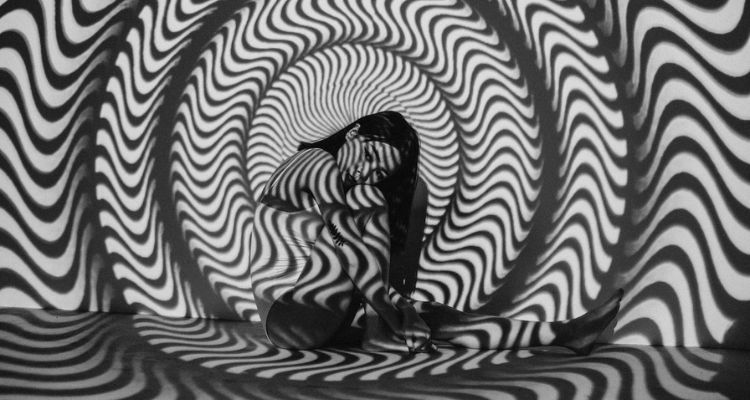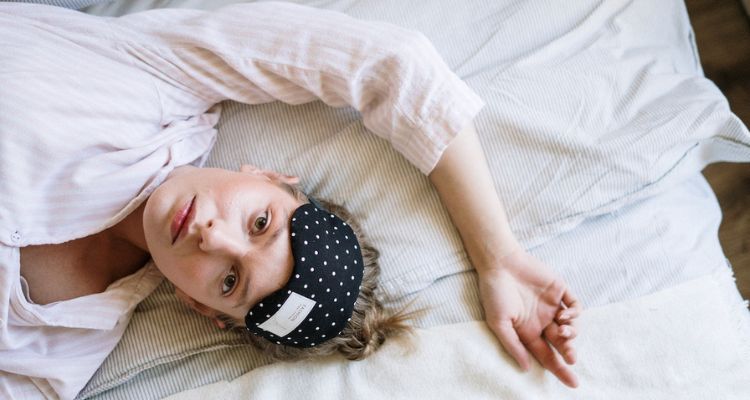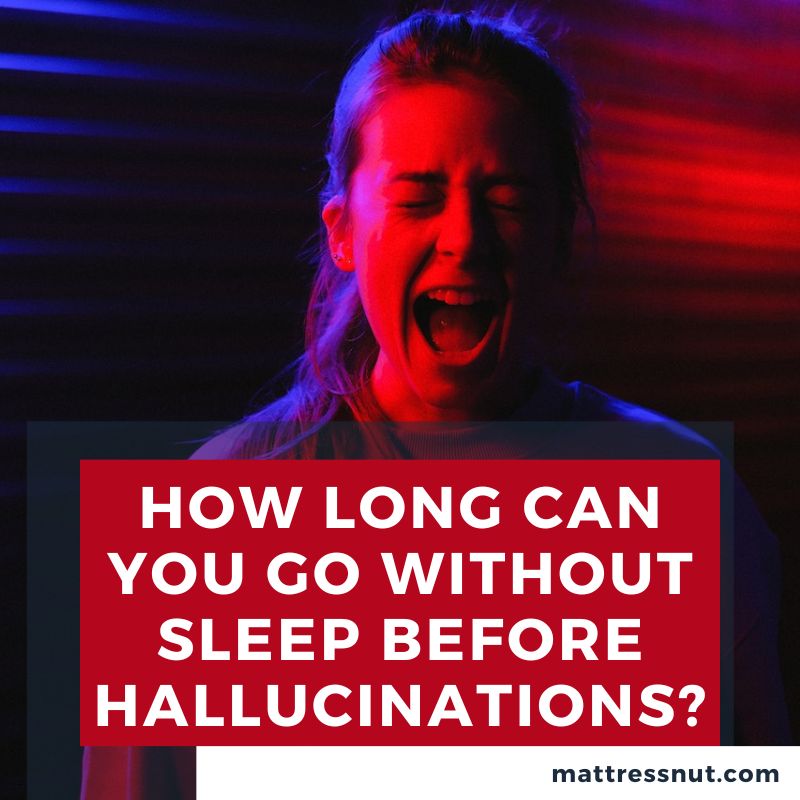Have you ever had anyone tell you that you hear things? You might think they have lost their mind, and you are not going that far off. Well, it’s called hallucination if you start sensing things that aren’t there.
Hallucinations are mechanisms our brains conjure up that don’t exist and involve our neurons too. Of course, we process all information using our brains. There is no adequate way to find out whether something we felt was real or not.
Hallucinations occur due to sleep deprivation. Therefore, you must know how long you can go without sleep before hallucinations kick in. Sleep deprivation is hazardous for your health. Your body becomes more prone to obesity (also check 10 great mattresses for overweight people), high blood pressure, diabetes, anxiety, hypertension, stress, depression, and so on.
Let’s find out how hallucinations occur and why sleep deprivation is a big problem.
Key Takeaways
- Sleep deprivation can lead to hallucinations because when you are sleep deprived, your brain enters REM sleep more often to make up for the lost hours. REM sleep is when the brain is highly active and susceptible to hallucinations.
- There is no definitive answer for how long someone can go without sleep before hallucinating. It varies from person to person, with estimates ranging from 24-72 hours of no sleep before hallucinations start. Other factors like mental illness, drugs, and brain activity also impact it.
- Profound sleep deprivation beyond 3-4 days can cause severe cognitive impairments, irritability, delusions, paranoia, and psychosis. Chronic partial sleep deprivation over the long-term increases the risks of obesity, diabetes, heart disease, stroke, and mental illness.
- While going one day without sleep may just cause moodiness and fatigue, prolonged deprivation can have dangerous health consequences. Most adults need 7-9 hours of sleep per night. Getting enough good sleep is vital.
- The article provides an overview of sleep deprivation and its effects like hallucinations. Key points are that deprivation impacts people differently, but extended lack of sleep can cause cognitive and physical decline and mental health issues. Prioritizing sleep is important.
The Hallucinations
A hallucination is a complex process involving different parts of your brain. It begins with your occipital lobe, which is there to process an image in the brain.

And from there, the information travels to your parietal lobe, which allows you to understand where different objects are located and how they look. For instance, when visual hallucinations occur, what you are seeing or experiencing is not real. It’s just a piece of sensory information that your brain is wrongly processing.
When two lobes coordinate, they don’t create a picture of reality. As a result, people start seeing things that don’t exist – a hallucination. In all kinds of hallucinations, the brain makes things up using sensory inputs, and you start feeling them as if they are real.
There are five major kinds of hallucinations. These are:
Auditory
These hallucinations are pretty common, and people claim to hear things. You tend to start hearing voices due to this mental illness. It’s pretty hard to diagnose because you think you have heard something, but it’s not real.
If you have been in public, felt someone called your name, and discovered it didn’t happen! Well, these are pretty common, and they are not hallucinations.
True auditory hallucinations are more convoluted, and that’s why they are hard to differentiate between these hallucinations and the inner monologue of your brain.
Visual
Another one of the most common hallucinations for people dealing with sleep deprivation is visual hallucinations. It can be in the form of bright light or shadows that move around, mainly if you are in a dark room.
But a common misconception here is that people consider mirages as hallucinations. Mirages are when you see something that exists in the wrong location. Hallucinations are seeing things that don’t exist.
Tactile
A good example is when you start feeling bugs crawling over your skin, even if no bugs are touching you. It can occur with people who are sleep deprived, as people can claim that they feel as if some unseen force is holding them down, resulting in sleep paralysis.
Olfactory
Olfactory hallucinations make sense as our nose is one organ that functions as we are unconscious or sleeping. So, if you think in your brain that you are being smothered to death, your brain might signal “this smells funny” to your nose even if there is no smell.
Gustatory
It will only occur if you have a dry mouth due to lack of water or if someone has drugged your drink without your knowledge. This hallucination is rare, and you might not even notice it often.
Why does Sleep Deprivation Cause Hallucinations?
Well, it’s pretty simple because when you’re sleep deprived, your brain is trying to make up for those lost hours by spending more time in the Rapid Eye Movement stage. And this stage is about dreaming.
During the REM stage, brains are hyperactive and highly susceptible as we enter our alpha state of mind during sleep. When you combine this activity with sleep deprivation, hallucinations can become much clearer. It is like a video as your brain is trying to cover the lost hours by developing images that, according to it, should be there.
And as a result, you start seeing and hearing things. If you are hallucinating due to sleep deprivation, it is best to get some rest in a dark room. As a result, your brain will stop covering the lost time by creating images from absolutely nothing.
Other Causes of Hallucination
Apart from sleep deprivation, mental illness and drugs can be some other causes of these hallucinations. People with mental illnesses like psychosis and schizophrenia are more prone to these hallucinations.
Schizophrenic people start seeing things that aren’t there and tend to hear voices in their heads. In contrast, psychosis is the next level where delusions occur and false beliefs such as anxiety and paranoia about what other people think.
Drugs can cause hallucinations, especially the drugs like THC and LSD. These are recreational drugs, and they make people see things that don’t exist. However, these drugs don’t last longer within the body.
How Long Can You Really Go without Sleeping?
There isn’t a definitive answer to this question because it differs from one individual to another. Some people can barely manage a few days without sleep and don’t hallucinate. While others begin to see and hear things even after 20 hours of sleep deprivation.
It will only stop when they take drugs or get some rest. Therefore, you should be fine if you don’t push yourself too much. A study shows that people start hallucinating when they stay awake for about 24 to 72 hours.
But there is no exact time to see hallucinations due to sleep deprivation. It heavily depends upon their brain activity, drugs, and how tired they feel. In a much simpler perspective, anything tangles up your brain activity can start causing hallucinations.
But there are some extreme repercussions as well. For instance, if you use cocaine and alcohol and are sleep-deprived as well, you can go into a coma instead of start hallucinating. It will especially be the case if you exaggerate your intake and sleep deprivation.

Problems with Prolonged Sleep Deprivation
Sleep deprivation has been recorded; the longest time without sleep is 264 hours. It measures up to slightly over 11 days consecutively. However, it is unclear how long humans can survive without sleeping. The effects of sleep deprivation begin to show after a specific time.
Sleep deprivation of only three or four nights can start causing hallucinations. While prolonged sleep deprivation can cause:
Cognitive impairments
It’s a condition when an individual has trouble remembering and learning new things. People with cognitive impairments lack focus and concentration and have decision-making issues.
Irritability
People with sleep deprivation get irritated quickly; they become much more impatient and angry over normal situations.
Delusions
These are false but fixed beliefs that conflict with reality. These people can’t let go of their false convictions even if contrary evidence is available.
Paranoia
It involves fear and anxiety about conspiracy, threat, or persecution. It can occur with various health conditions.
Psychosis
Its disruption of an individual’s thoughts and perceptions makes it challenging for them to differentiate between reality and imagination.
Can Sleep Deprivation Become Chronic?
CPSD, or Chronic Partial Sleep Deprivation, is a condition when you aren’t getting enough sleep regularly. This is something different from when you don’t end up sleeping all night once in a while.
CPSD does have long and short-term repercussions. And if you don’t get enough sleep for a week or so, it might cause:
- Unstable mood
- Forgetfulness
- Anxiety
- Drowsiness
- Lack of focus
- Lack of alertness
- Cognitive impairments
- Increased risk of injury
- Reduced performance
But if CPSD continues in the long run, it can result in:
- Stroke
- Heart diseases
- High blood pressure
- Mental illness
- Obesity
- Diabetes
Conclusion:
Sleep deprivation isn’t something that you should do for too long. While 24 hours of sleep deprivation will only result in a few mood swings, forgetfulness, and slight dizziness. But any prolonged sleep deprivation will make things more difficult for you.
Hallucinations tend to occur differently for different people. Some people start experiencing hallucinations after 20 hours of sleep deprivation, while others don’t hallucinate even after 48 hours. The time frame ranges from 24 to 72 hours when sleep deprivation makes you start seeing and hearing things.
Sleep deprivation & hallucinations FAQs
What to expect after 24 hours without sleep?
It is common not to sleep for a day, whether working overnight, cramping a test, or even taking care of a child. It will feel unpleasant, but there are no significant health impacts here.
Can water and food intake affect sleep deprivation?
Sleep deprivation can indeed alter your appetite and the foods you crave. It is directly related to an increased appetite and craving for fats and sugars. But consuming these empty cavities can result in even more tiredness.
How much sleep is required?
How many hours of sleep you need per day depends on your age. Newborns should sleep for about 14 to 17 hours per day, while infants need 12 to 16 hours of sleep per day. Toddlers should sleep for about 11 to 14 hours per day, while preschool children should sleep for at least 10 to 13 hours daily. School-going children must sleep for around 9 to 12 hours per day, while teens sleep for about 8 to 10 hours. Adults have to sleep for about 7 to 9 hours per day.
How long does it take to recover?
It can take anywhere from a few days to a few weeks from sleep deprivation. You will need 4 days to recover if you have lost just one hour of sleep. So, the longer you stay awake, the longer it will take to recover.

